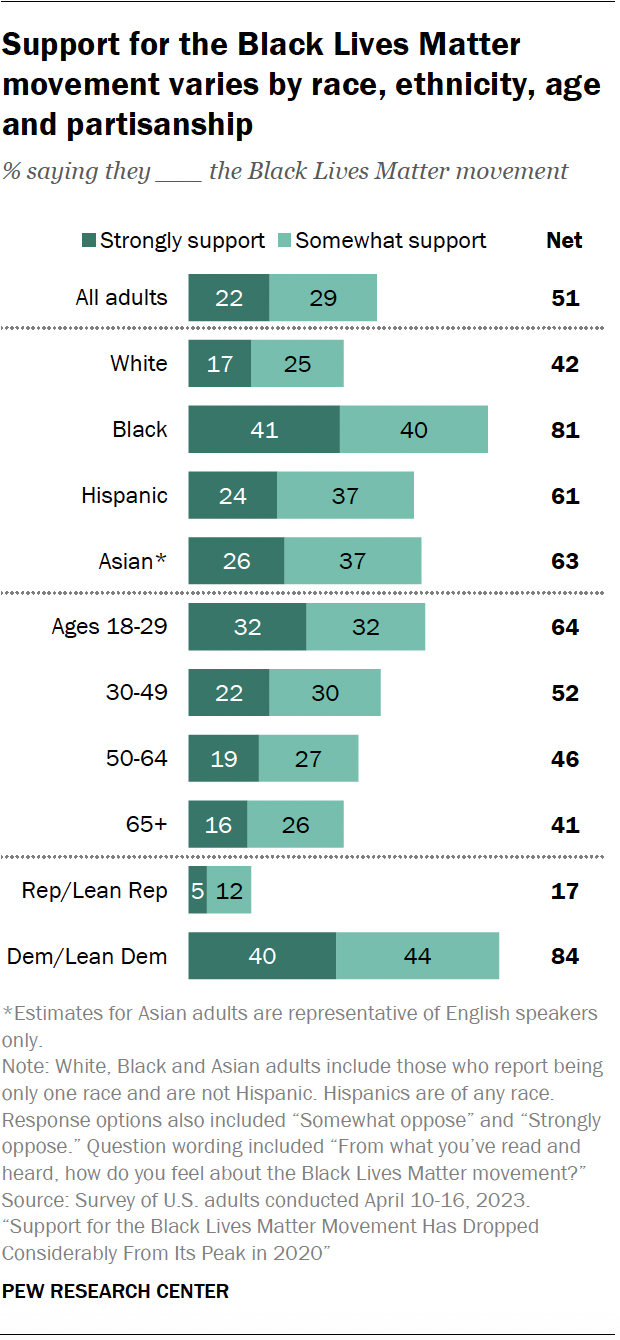 the Black Lives Matter movement varies by race, ethnicity, age and partisanship." width="620" height="1340" />
the Black Lives Matter movement varies by race, ethnicity, age and partisanship." width="620" height="1340" />In the 10 years since the #BlackLivesMatter hashtag was first used on social media, it has appeared in more than 44 million tweets, according to a recent Pew Research Center report. On a typical (median) day, #BlackLivesMatter appears in about 3,000 tweets as users discuss topics such as racism, violence and the criminal justice system.
Use of the hashtag has often surged around specific acts of violence against Black Americans. The hashtag first appeared in July 2013, after George Zimmerman was acquitted in the 2012 shooting death of 17-year-old Trayvon Martin in Florida. Its use peaked at over 1.2 million tweets per day after Minneapolis police officer Derek Chauvin murdered George Floyd in May 2020.
As we mark 10 years since the hashtag originated, here are eight facts about the Black Lives Matter movement.
How we did thisPew Research Center sought to explore the impact and reach of the Black Lives Matter movement 10 years after the #BlackLivesMatter hashtag originated on Twitter. This post includes survey findings from Center studies conducted from 2021 to 2023, as well as a Center analysis of Twitter activity from July 2013 to March 2023. Links to the methodology for each publication, including the questions asked in each survey, can be found in the text of this analysis.
About half of adults in the United States (51%) say they support the Black Lives Matter movement, according to a 2023 Center survey. This includes 22% who strongly support it and 29% who somewhat support it.
 the Black Lives Matter movement varies by race, ethnicity, age and partisanship." width="620" height="1340" />
the Black Lives Matter movement varies by race, ethnicity, age and partisanship." width="620" height="1340" />
There are significant differences in opinion by race and ethnicity, political party, and age. About eight-in-ten Black Americans (81%) support the movement, compared with 63% of Asian, 61% of Hispanic and 42% of White Americans. Democrats and those who lean toward the Democratic Party are about five times as likely as Republicans and Republican leaners to support Black Lives Matter (84% vs. 17%). And whereas most adults ages 18 to 29 (64%) support the movement, 41% of those ages 65 and older do.
Support for Black Lives Matter has decreased significantly among U.S. adults since June 2020, the same Center survey shows. Two-thirds of adults strongly or somewhat supported the movement in June 2020 – shortly after Floyd was murdered – but that share fell to 56% in March 2022 and 51% in April 2023.
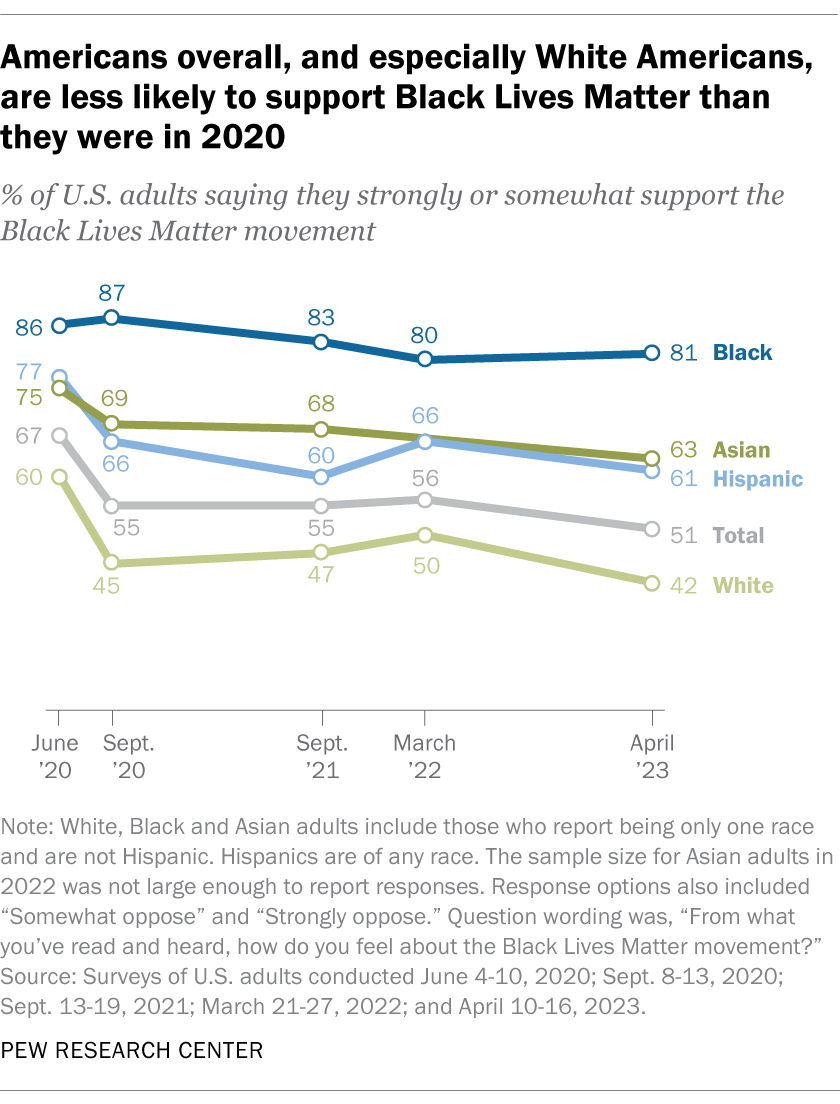
The decline is largely due to a smaller share of White adults supporting the movement. In June 2020, 60% of White adults said they supported Black Lives Matter, but that share fell to 50% in 2022 and 42% this year. Support among Asian and Hispanic adults has also fallen since 2020, but not as sharply as it has among White adults. In contrast, about 80% or more of Black adults have expressed support for the movement every year since 2020.
Most teenagers support the Black Lives Matter movement, according to a separate Center survey conducted in 2022. Seven-in-ten Americans ages 13 to 17 said they strongly or somewhat support the movement.
 the Black Lives Matter movement." width="620" height="940" />
the Black Lives Matter movement." width="620" height="940" />
Black and Democratic teenagers were especially likely to support the movement. Some 92% of Black teenagers said they support it, compared with 82% of Hispanic and 57% of White teenagers. (There were not enough Asian teens in the sample to allow for separate analysis.) And 94% of Democratic teens said they support Black Lives Matter – more than twice the share of Republican teens who said the same (42%).
Among U.S. adults, 7% say they have ever attended a Black Lives Matter protest, according to the 2023 Center report. Even among the demographic groups that are most likely to support Black Lives Matter, the shares of people who have attended a protest are low.
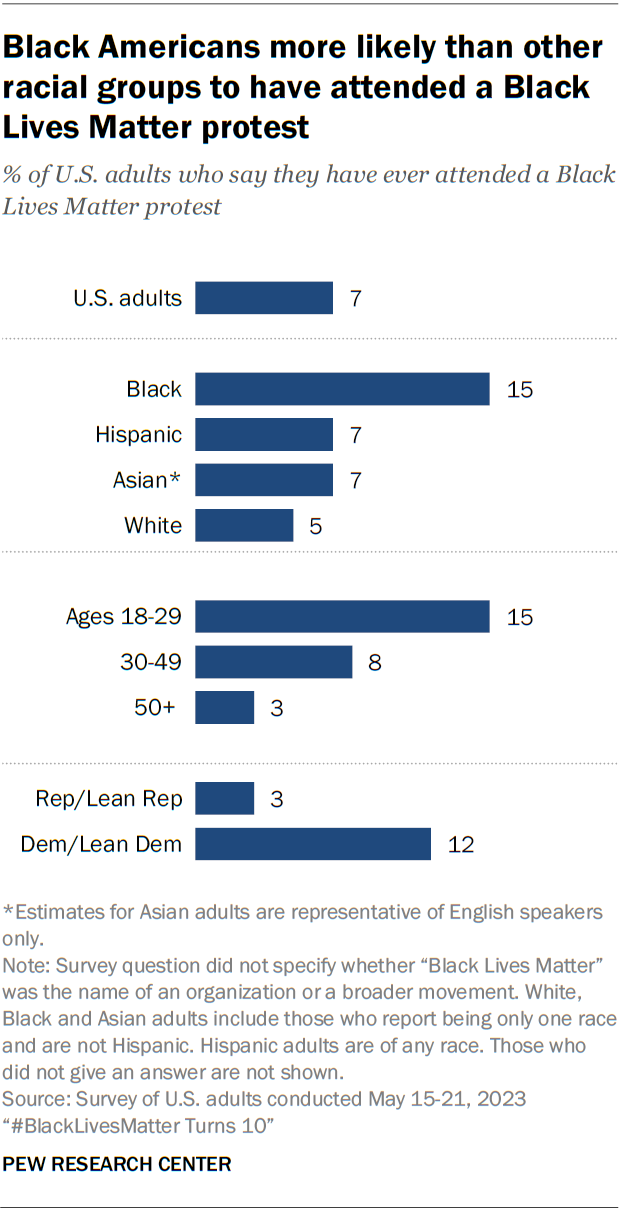
Some 15% of Black adults say they have attended a Black Lives Matter protest; they are more likely than Hispanic, Asian or White adults to say they have done so. Similarly, adults ages 18 to 29 are about twice as likely as those 30 to 49 and five times as likely as those 50 and older to have attended a Black Lives Matter protest. And Democrats are four times as likely as Republicans to have done this.
Many Black adults in the U.S. say Black Lives Matter has done the most to help Black people in recent years. About four-in-ten Black adults (39%) said this in a 2021 Center survey. That far exceeded the share of Black adults who said the same about any other entity asked about in the survey, including the NAACP, Black churches or other religious organizations, the Congressional Black Caucus and the National Urban League. (This survey did not specify whether Black Lives Matter referred to an organization or the broader movement.)
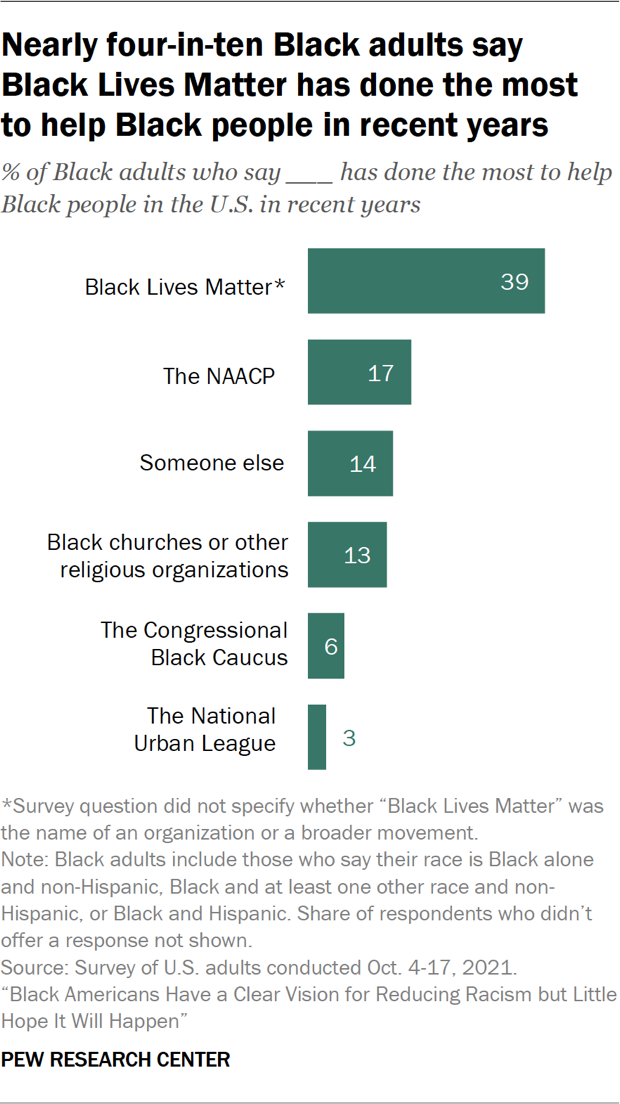
The public is divided on how effective the Black Lives Matter movement has been at bringing attention to racism against Black people in the U.S. About a third of adults (32%) say the movement has been extremely or very effective at this. Some 35% say it has been somewhat effective, while 30% say it has been not too or not at all effective, according to the 2023 Center survey.
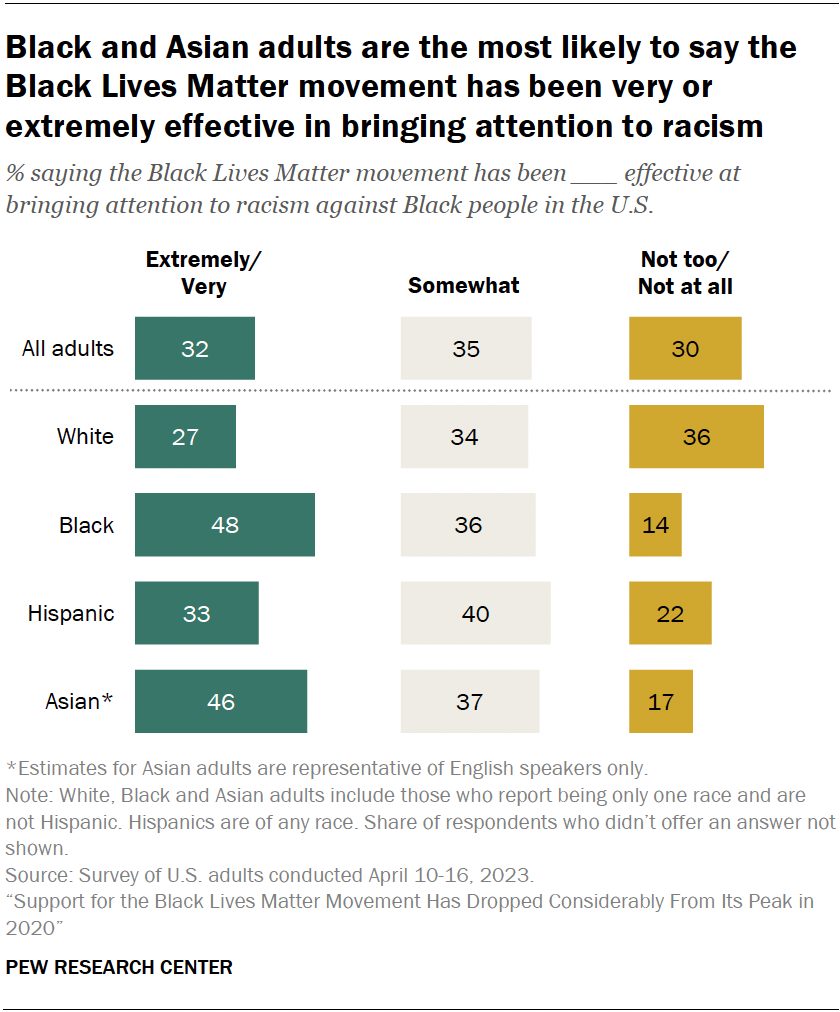 the Black Lives Matter movement has been very or extremely effective in bringing attention to racism." width="840" height="1012" />
the Black Lives Matter movement has been very or extremely effective in bringing attention to racism." width="840" height="1012" />
Black and Asian adults are more likely than other racial and ethnic groups to say the movement has been extremely or very effective at bringing attention to racism in the country. Some 48% of Black adults and 46% of Asian adults say this, compared with 33% of Hispanic and 27% of White adults.
The public gives the Black Lives Matter movement lower marks on some other questions. Only 14% of U.S. adults say the movement has been extremely or very effective at increasing police accountability; 8% say it has been effective at improving the lives of Black people; and 7% say it has improved race relations.
A large majority of social media users in the U.S. (77%) say they have seen content on social media related to Black Lives Matter, but far fewer report having ever posted or shared something about this topic, according to the 2023 Center report. Some 24% of social media users say they have posted or shared content supporting Black Lives Matter, while 10% have shared content opposing it.
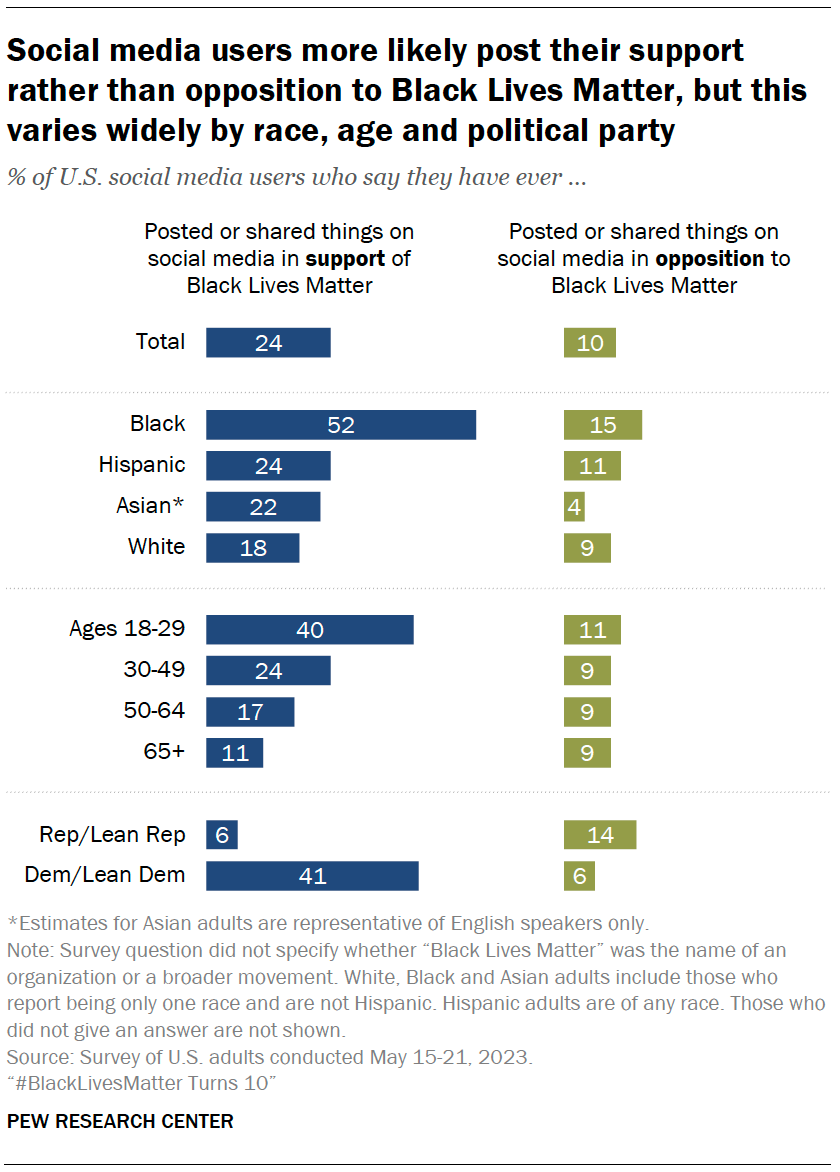 the Black Lives Matter movement has been very or extremely effective in bringing attention to racism." width="840" height="1172" />
the Black Lives Matter movement has been very or extremely effective in bringing attention to racism." width="840" height="1172" />
Black social media users are particularly likely to have posted in support of Black Lives Matter: 52% have done so, compared with 24% of Hispanic, 22% of Asian and 18% of White users. Younger users are also more likely than older users to have posted or shared something in support of Black Lives Matter, as are Democrats when compared with Republicans.
On Twitter specifically, millions of people first engaged with the #BlackLivesMatter hashtag following Floyd’s murder. Between May and September 2020, 5.8 million distinct users shared a tweet that contained the hashtag for the first time.
A majority of social media posts that use the #BlackLivesMatter hashtag are supportive, the same report finds. Between July 2013 and March 2023, about seven-in-ten publicly available tweets that used the hashtag (72%) were positive toward the movement. Another 17% were neutral and 11% were negative.
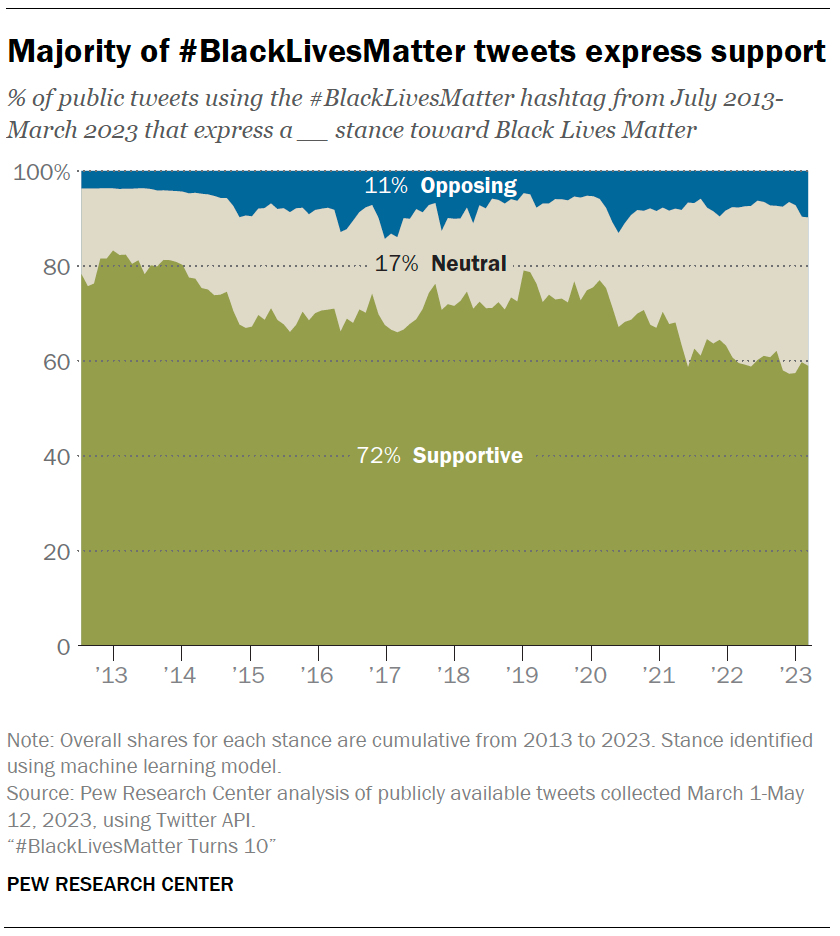
Supportive tweets commonly include words such as together, justice, change, brutality and murder, whereas negative tweets often use words such as riot, assault, criminal and violent.